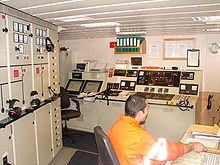| Revision as of 10:11, 2 January 2019 editMadrenergic (talk | contribs)Extended confirmed users3,506 edits merge from Engineering officer (ship)← Previous edit | Revision as of 14:01, 2 January 2019 edit undoMadrenergic (talk | contribs)Extended confirmed users3,506 edits update wikilinkNext edit → | ||
| Line 20: | Line 20: | ||
| * (1) ] | * (1) ] | ||
| * (1-2) ] | * (1-2) ] | ||
| * (2-4) ] (unlicensed Junior Engineer) | * (2-4) ] (unlicensed Junior Engineer) | ||
| * (0-1) ] (unlicensed Trainee engineer) | * (0-1) ] (unlicensed Trainee engineer) | ||
| * (0-2) ] | * (0-2) ] | ||
Revision as of 14:01, 2 January 2019
| This article includes a list of general references, but it lacks sufficient corresponding inline citations. Please help to improve this article by introducing more precise citations. (July 2012) (Learn how and when to remove this message) |

An engine department or engineering department is an organizational unit aboard a ship that is responsible for the operation, maintenance, and repair of the propulsion systems and the support systems for crew, passengers, and cargo. These include the ship engine, fuel oil, lubrication, water distillation,separation process, lighting, air conditioning, and refrigeration.
The engine department emerged with the arrival of marine engines for propulsion, largely during the later half of the 19th century. Due to advances in marine technology during the 20th century, the engineering department aboard merchant ships is considered equally important as the deck department, since trained engineers are required to handle the machinery on a ship.
Typically, a ship's engine department is run by the engineering officers but manned with other occupational specialties of the seafarer's trade like:
- Machinist/Fitter: A rating (or petty officer) who is specialized in fabrication, welding, etc.
- Motorman: A, not always, qualified engine rating who stands a watch with the Engineer Officer, as well as performing menial tasks and assisting Engineering Officers during maintenance.
- Oiler: A rating who is responsible for ensuring that machinery is adequately lubricated. Performs menial tasks such as cleaning, sounding tanks etc.
- Wiper: The lowest rating in the engine room and is tasked with keeping the machinery spaces clean and tidy. Wipers usually go on to become oilers once they are familiar with engine room machinery and specific routines.
Defunct positions within the engine department include the fireman, who was a rating responsible for shoveling coal into the boiler furnaces of steam engines, and the coal trimmer, a rating that loaded coal in the bunkers and transported the coal from the bunkers to the firemen.
Nowadays due to the increase in automation on merchant vessels and the increase in the unattended machinery spaces (UMS) aboard them, the number of seafaring engineers has decreased drastically on board merchant ships. Today, the engine department usually consists of the following number of engineers and ratings:
- (1) Chief engineer
- (1) Second engineer
- (1) Third engineer
- (1-2) Fourth engineer
- (2-4) Motorman (unlicensed Junior Engineer)
- (0-1) Engine Cadet (unlicensed Trainee engineer)
- (0-2) Oiler
- (0-1) Wiper
Additionally, many vessels also carry a specific type of engineering offcier known as an electro-technical officer.
See also
- Engineering officer (ship)
- Engine room
- List of maritime colleges
- Marine fuel management
- Seafarer's professions and ranks
- Society of Naval Architects and Marine Engineers
- Marine Engineers Network
References
| This article includes a list of general references, but it lacks sufficient corresponding inline citations. Please help to improve this article by introducing more precise citations. (November 2008) (Learn how and when to remove this message) |
| Shipboard occupations | |||||
|---|---|---|---|---|---|
| Deck department |
| ||||
| Engine department |
| ||||
| Steward's department |
| ||||
| Others | |||||
| Related | |||||